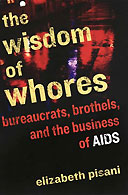
The Wisdom of Whores: Bureaucrats, Brothels, and the Business of Aids
by Elizabeth Pisani
372pp, Granta, £17.99
"'In the Aids industry," writes Elizabeth Pisani, "we were all whores." In her new book, Pisani certainly presents an image different from that of the worthy medics and epidemiologists who have, in her judgment, prostituted their scientific expertise in the global crusade against Aids. She describes herself as a "cynical, wise-cracking, number-crunching ex-journalist"; she also has a degree in Chinese and a doctorate in epidemiology. She has emerged from a decade in the Aids bureaucracy, much of it spent in the bars, brothels and prisons of south-east Asia, to expose some of the myths that prevail in a world "where money eclipses truth".
By 1998, Pisani writes, it was clear that "HIV wasn't going to rage through the billions in the 'general population', and we knew it". In fact this was already clear when the British government launched its notorious "tombstones and icebergs" publicity campaign in 1987: as I wrote at the time in The Truth About the Aids Panic, "There is no good evidence that Aids is likely to spread rapidly in the west among heterosexuals." However, more than a decade later Pisani and her colleagues continued to exaggerate both the scale of the epidemic and the threat to people outside well-recognised high risk categories.
Pisani disputes the claim made last year by James Chin, another former Aids industry epidemiologist, in his book The Aids Pandemic: The Collision of Epidemiology with Political Correctness, that UN Aids experts deliberately overestimated the epidemic. There is a "huge difference", she insists, "between making it up (plain old lying) and beating it up", which she considers a legitimate journalistic ploy of "making a big, interesting, dramatic story out of something that may actually be rather mundane". The hugeness of this difference appears to be another example of self-justifying spin.
Pisani explains how she and her colleagues manipulated the figures, presenting them "in their worst light". They "did it consciously" to foster public alarm and squeeze more money for prevention campaigns out of governments and donors. What was once characterised as the good lie of the "Don't Die of Ignorance" campaign (which Pisani briskly dismisses as the "everyone is at risk nonsense"), Chin describes as a "glorious myth", justified by the goal of promoting public anxieties about Aids and sexual restraint. Yet, as Pisani concedes elsewhere, "lies are lies whichever side of the political spectrum they come from".
Pisani also challenges the Aids industry mantra that HIV is a disease of poverty and gender inequality. Bangladesh has high levels of both, but low rates of HIV. South Africa and Botswana have the highest levels of female literacy and the highest per capita income in Africa - and also the highest rates of HIV. In Guinea, Somalia, Mali and Sierra Leone women are ill-educated and poor, but have relatively low rates of HIV. In many African countries, HIV levels are highest in rich households and lowest among the poor. It is vital, Pisani emphasises, not to lose sight of the fact that HIV is a sexually transmitted infectious disease. Key factors in its spread are coincidental genital infections and a low rate of circumcision. As Helen Epstein, yet another former Aids industry insider, explains in The Invisible Cure: Africa, the West and the Fight against Aids, the distinctive pattern of concurrent "webs" of sexual partners, by contrast with the pattern of serial "chains" or "strings" of partners, seems to have facilitated the explosive spread of HIV in Africa.
While Pisani presents a radical critique of her former bosses, when it comes to policy recommendations she is explicitly reactionary. She reminds us that "public health is inherently a somewhat fascist discipline", in which it is sometimes necessary - for example, in the imposition of quarantine restrictions - to violate the rights of a few to protect the health of the many. Regretting the enduring influence of gay rights activists in upholding principles of consent and confidentiality in relation to HIV testing, Pisani seeks to revive the authoritarian traditions of public health. She favours mandatory testing and contact-tracing and linking the provision of treatment to agreement to participate in prevention programmes. She breezily recommends measures of "blackmail and bribery" and - dismissing the notion of empowering sex workers - suggests putting the enforcement of condom use into the hands of pimps and brothel owners.
For Pisani, dictatorship is more constructive than democracy. Whereas democratic politicians are inclined to make concessions to voters with religious convictions, who lack sympathy for drug users, or gay men, or sex workers, the generals in Thailand or the mullahs in Iran are free to pursue the sort of pragmatic "harm reduction" needle exchange and condom promotion policies she favours.
In her last chapter, Pisani returns to Hong Kong, where she spent her youth - and had her first conversation with a prostitute. She concludes with an enthusiastic endorsement of the "sensible" policies of the Beijing bureaucrats, who have "refocused their prevention efforts on drug injectors, gay men and the sex industry". In another sense too, Pisani reveals how the Aids activists have also come full circle, to the coercive approach of the Contagious Diseases Acts of the 1860s, which tackled an epidemic of venereal diseases in Britain's armed forces by subjecting prostitutes to compulsory examination and treatment. It is ironic that, more than a century after the pioneering feminist campaign led by Josephine Butler for the repeal of these repressive measures, Pisani's advocacy of a return to Victorian coercion has the appearance of a radical alternative to the deceitful posturing and colossal wastefulness of the crusade against Aids. Michael Fitzpatrick is a GP and author of The Truth About the Aids Panic (Junius) and MMR and Autism: What Parents Need to Know (Routledge).
· Elizabeth Pisani appears at the Hay festival (24th May 2008).

